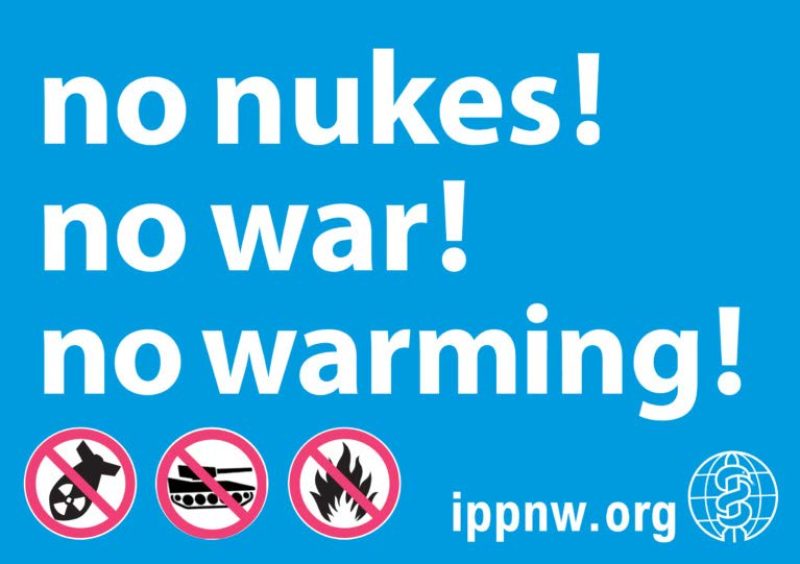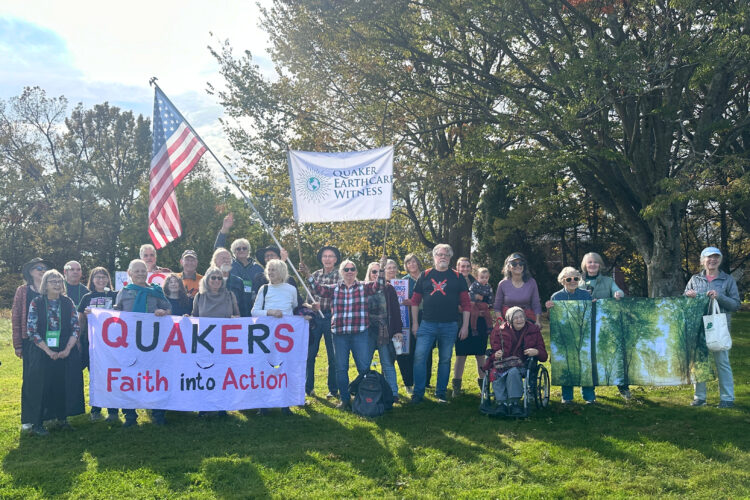Pathways to Peace: Linking Disarmament and Climate Action

by Molly McGinty
The ongoing climate crisis and escalating threat of nuclear war pose the most acute threats to human and planetary survival. These twin existential threats to life are closely linked and mutually reinforcing, each requiring urgent action.
In 2023, the UN’s Intergovernmental Panel on Climate Change (IPCC) once again warned us that we need to make immediate, rapid, and large-scale reductions in greenhouse gas emissions by 2030 to avoid reaching or surpassing the 1.5°C rise in global temperatures. From fires, to floods, to extreme heat, human-caused climate change is already having increasingly adverse impacts on communities and the environment in every region of our shared world. If our government’s policies and actions do not soon shift course, we will likely reach a 3°C rise in global temperature by the end of the century, dramatically increasing the lasting damage to the planet and its people.
As a “threat multiplier,” the climate crisis is intrinsically linked to global peace and security by exacerbating existing inequalities and intensifying competition over scarce resources. While instability and conflicts increase, so does the risk of nuclear war. With the escalating climate crisis, faltering international norms, and multiple wars involving nuclear armed states, experts warn that the risk of nuclear war is higher now than it was at the height of the Cold War. While we are already facing the consequences of the climate crisis, a nuclear war is an abrupt climate crisis in waiting.
A single nuclear detonation anywhere would be a humanitarian catastrophe, resulting in the immediate deaths of tens of thousands of people, with tens of thousands of additional people left with crumbling infrastructure, complex injuries, and no way to receive necessary healthcare. A nuclear war would end life as we know it. An International Physicians for the Prevention of Nuclear War (IPPNW) study finds that even a regional nuclear war between India and Pakistan, two nuclear armed states often in conflict, would loft so much soot and debris into the atmosphere that it would block the sun for decades to follow, leading to abrupt global cooling of 1.3°C. In the years and decades to follow, this so-called “limited” nuclear war involving just 3% of the world’s arsenals would alter the world’s climate in such a way as to reduce harvest times for the staple grains and put 2 billion people around the world at risk of starvation.
A large-scale nuclear war would be even more devastating. A conflict between the US and Russia would destroy all the major cities of the two countries, killing millions of innocent people, and plunge the world into a nuclear winter, dropping temperatures an average of 6.5°C. The collapse of the global ecosystem and modern society would wipe out the majority of the human race.
Even when nuclear weapons are not used, their continued existence not only threatens human survival, it also diverts massive amounts of resources that could be spent on reversing the climate crisis and addressing other pressing issues. In 2023 alone, the nine nuclear armed states spent $91.4 on maintaining, modernizing, and increasing their nuclear arsenals, a 13.4% increase from 2022. While nuclear armed states invest in and threaten an armageddon of their own creation, annually 309 million people face chronic hunger, half the world’s population does not have access to essential healthcare, and millions are displaced from their homes due to armed conflict. We have the resources to rid the world of these human-made ills.
These twin threats to life — global warming due to burning of fossil fuels and abrupt global cooling following a nuclear war — require urgent, bold action. On a local, national, and international level, we must continue to call on leaders to immediately shift to renewable energy, protecting the planet from further extraction and providing careers fit for 21st Century needs. Countries must adhere to their existing climate promises, including the Paris Climate Agreement, and join the growing bloc of States seeking a mandate for a Fossil Fuel Treaty.
With the support of the majority of the world’s nations, the UN Treaty on the Prohibition of Nuclear Weapons (TPNW) provides a clear path toward the total abolition of nuclear weapons. We must call on all countries, especially the nine nuclear armed states, to adhere to their obligations to disarm and engage with the TPNW at the earliest possible date. In the United States, Americans can build growing support for a nuclear weapons free world by calling on their Congressperson to support H. Res. 77, Embracing the goals and provisions of the TPNW. Internationally, individuals can encourage their city to join the ICAN Cities Appeal, taking action to push their national governments to join the TPNW.
As stewards of this world, it is up to each of us to take action whenever, and wherever, we can to create a sustainable, just planet for generations to come. IPPNW is one of many organizations working to abolish nuclear weapons.
Go to IPPNW.org or follow @IPPNW to stay up to date
Molly joined IPPNW in 2019 as a Quaker Voluntary Service Fellow and has remained on staff since the completion of the program. She was raised in a suburb of Baltimore, Maryland, where she first gained a passion for justice-centered work. As IPPNW’s Associate Program Director, Molly assists in coordinating their work on the medical and humanitarian consequences of nuclear weapons. She also works alongside the International Student Representatives, medical student groups, and youth partners to raise the voices of young people in nuclear abolition. She currently serves as one of IPPNW’s representatives on ICAN’s International Steering Group.

